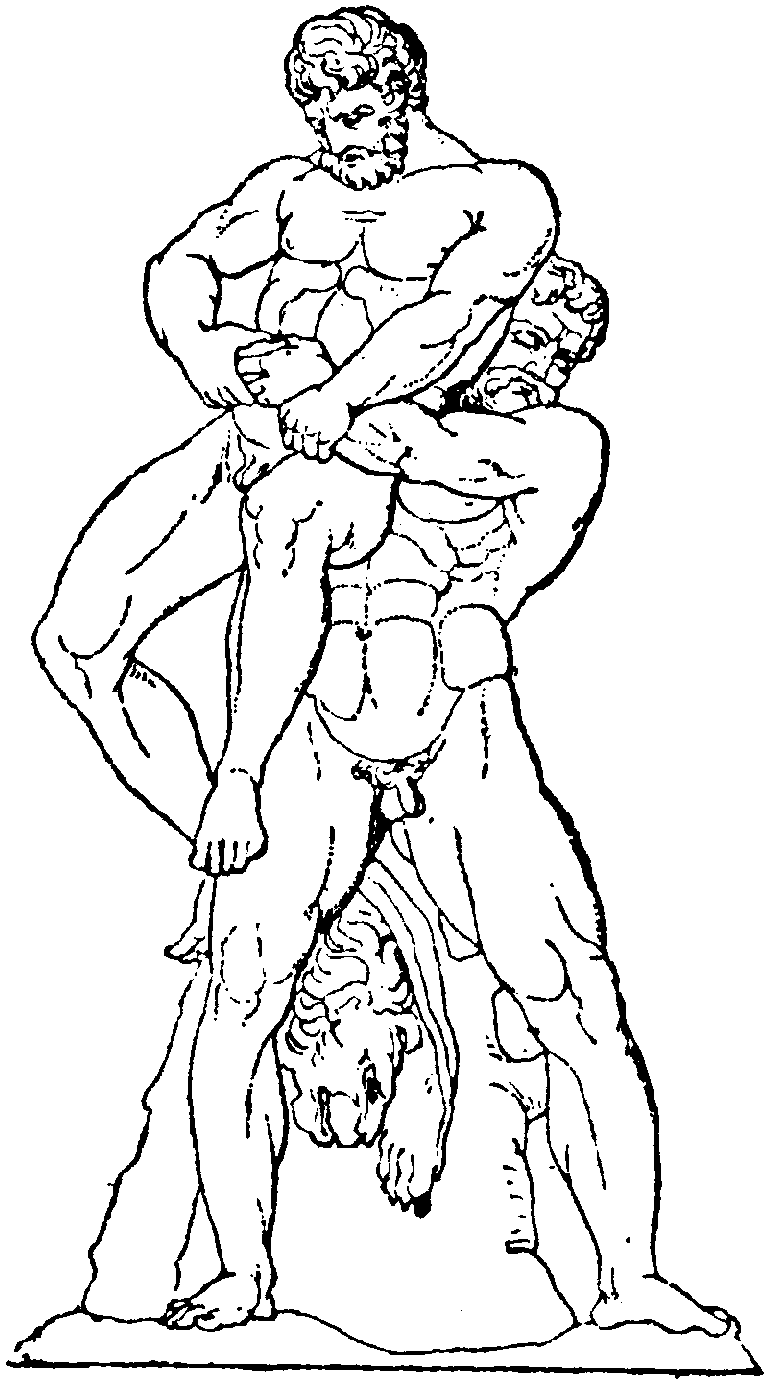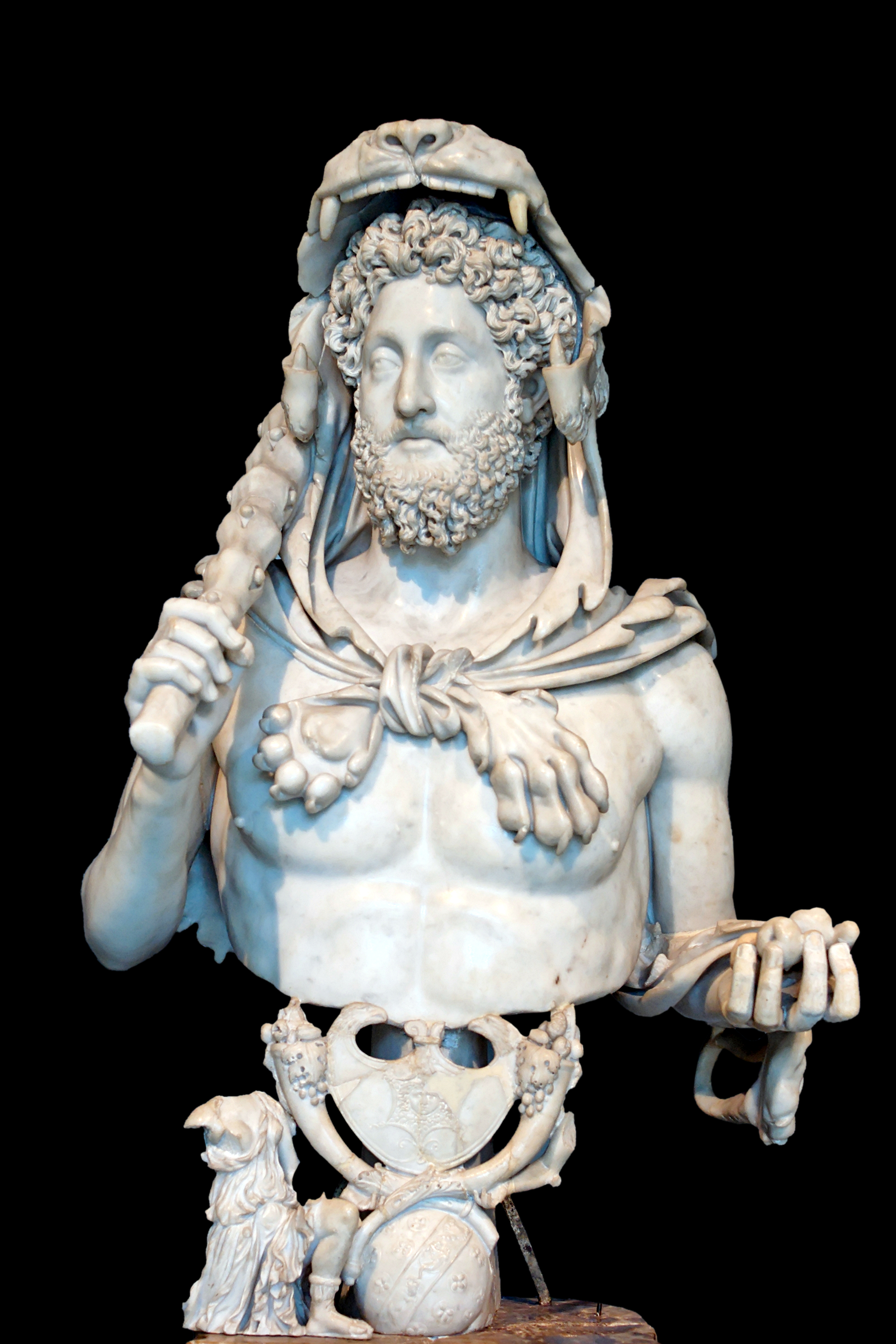Heracles was Greek, Hercules was Roman. Both were dressed in a crude lion pelt, carried a club and mostly kicked everybody who crossed their path, but they were in fact rather complex characters. I'm done with the obvious for now.
 |
| Hercules is the one who's winning |
One of the weirdnesses of Heracles / Hercules is that he's at the same time a mortal hero and a god – quite a unique feature for the Greek mythology. He should be representing the raw, brutal force, the original strength that allowed humans to subjugate nature. He was the first human hunter, the one who wasn't afraid to make a kill, if needed to survive, but wasn't seeking bloodshed either, since he had better things to do than club his neighbor to death. For instance, learn to use a plow. At the same time, Heracles is the ultimate hero of civilization, the one who removes the last monsters from the earth, so cities can expand and merchants can travel and spread the word without inhibitions. Heracles is credited with having taught the humans a number of useful things – the coolest, in my opinion, being that the Earth is a globe – something he learned while supporting it when Atlas was busy.
The Etruscan Hercle
The Roman Hercules is...well, not Roman, for the beginning. He was initially an Etruscan character named Hercle, depicted on coins and statuettes as early as the 6th century BC. Some scholars believe this Hercle was a sort of founding father of the Etruscans; or maybe even not a hero at all, but one of the main gods, given that, in some representations, he is associated with the goddess Menrva – possibly as her husband.
In other images, Hercle appears as a mature, bearded man, being breastfed by the goddess Uni. The myth behind this rather unusual imagery is unknown, but the coincidence is striking – the Greek Heracles was also breastfed by Hera, though that was accidental, and it happened when the hero was still a baby. (I assume you've guessed it, Uni – Hera – Juno are goddesses playing roughly the same role for Etruscans, Greeks and Romans).
The main thing left behind by this Hercle character was the interjection Hercle! or Mehercle!, which apparently was quite common in spoken Latin, often used in dramatic dialogues by Plautus. And Plautus being his funny little self, it's not impossible that this was a curse word.
The Romans adopted Hercle and, using the famous interpretatio graeca or interpretatio romana, which meant stealing other peoples' gods because there's no telling when you might need them, they mixed him with the Greek Heracles to obtain their own Hercules.
 |
| The first thing Hercules did in Rome was to shave |
Hercules in Rome
Hercules visited Rome very early, when there was no Rome – just a few houses scattered here and there. He went to sleep and left his cattle unguarded, and a local thief slash fire-breathing monster named Cacus stole some. (Why was Hercules guarding cattle all the way in the Italian peninsula? It has something to do with his 10th labor, and, in all due honesty, he had just stolen the cattle himself from the previous owner, Geryon.)
Most naturally, Hercules killed Cacus and got his cattle back, as well as the eternal gratitude of the (few) Romans. Tired after the fight, Hercules saw Bona Dea (a fertility goddess) celebrating her rites, and asked her for a drink to quench his thirst. The goddess, however, did not allow him to drink from her spring, because her ceremonies were open only to women, no men allowed. So Hercules built his own temple on the spot, and banned women from entering it. Real mature. The temple was called Herculis Invicti Ara Maxima and stood in Forum Boarium – Rome's cattle market. (Spend your entire life killing monsters and saving people, and remain forever associated with cows because of one silly incident. Go figure.)
The Romans also believed that Hercules erected other buildings while in the area, including a dam and a road that separated lake Lucrin from the sea, in Campania. As always, the Romans were very serious about their roads.
As a god, Hercules took over some responsibilities he did not have in Greece: he was the patron of gladiators, stone quarries and thermal baths. No idea what's up with the baths. Herculaneum near Vesuvius and another town with the same name in Dacia were both famous for the thermal waters.
 |
| Commodus in carnival costume |
A number of Roman emperors used the image of Hercules, the best known being Commodus, who was mad and cruel, but apparently not completely unworthy of the association, at least from the point of view of physical strength. Still, that club doesn't exactly scream sophistication.




